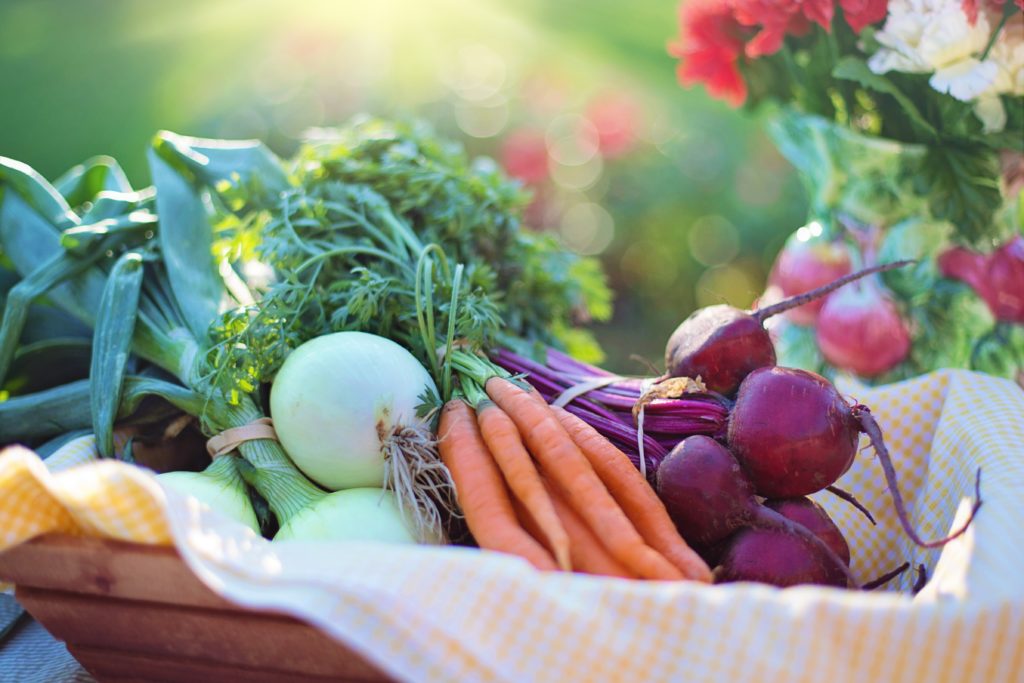Gardening Food Safely
Posted in Food Safety,Our Blog on April 8, 2019

Gardening is a healthy pastime in many ways. It offers the opportunity for low impact exercise, making it a suitable pursuit for individuals of different ages and abilities. As the Better Health Channel notes: “people with disabilities, seniors and children can find it especially rewarding[1]” as an avocation that is truly inclusive. Gardening gives individuals a chance to connect more closely with their food supply if growing edible plants. It allows family members or neighbors to work together on a project that reduces stress and offers quiet, meditative work. There are plenty of reasons to go start a garden in your yard or neighborhood, at your church or school. But Gardening Food Safely should be on the forefront of everyone’s minds.
Did you know “fresh veggies and fruit from non-organic gardens may have trace amounts of chemicals such as pesticides. All of these have the potential for making you and your family very sick, so cleaning harvested fruits and veggies is crucial prior to prepping a meal.” Read more at Gardening Know How: Washing Garden Vegetables: How To Clean Fresh Produce https://www.gardeningknowhow.com/edible/vegetables/vgen/washing-garden-vegetables.htm
Following the suggestions below will help safeguard health while reaping all the rewards gardening has to offer:
- Always wash your harvest. As tempting as it is to savor that fresh tomato or stalk of celery right in your garden plot, it is a better practice to get in the habit of washing your veggies before you consume them. Garden spiders and slugs like to cling to leafy greens. As Gardening Know How explains, “[2]even if you are practicing organic gardening and maintain proper sanitation of the home garden, bacteria, fungi and other microbes may adhere to your freshly picked produce.” If you are gardening with chemicals, it is all the more essential to thoroughly wash your harvest. This can be done with simple cold potable water. If you are concerned about pesticide exposure, soak your vegetables in a solution of 10 percent white vinegar and 90 percent water. Keep in mind that even if you are not using pesticides yourself, your neighbors might be in their yard or garden so it’s wise to earn on the side of caution.
- Wear gloves in the garden. Donning gardening gloves is not about an aversion to dirt. It is a simple and practical way to minimize contact with pathogens present in the soil. Minor cuts and abrasions are common during yard work and gardening and these small breaks in the skin to let a whole host of bacteria and fungi in. Scraps by rose thorns or garden tools can make one susceptible to infection by tetanus or sepsis. As Mark Blaskovich explains for The Conversation: “some microorganisms in soil can cause serious damage when given the opportunity to enter the body” so it always pays to err on the side of caution and glove up.[3]
- Monitor sun exposure. When consumed with outdoor work, it can be easy to lose track of time. It is vital, however, to be aware of the amount of sun exposure you are gaining while gardening. While getting your “sunshine vitamin,” your Vitamin D is essential for bone and teeth protection, cancer prevention and mood stabilization, it is possible to have too much of a good thing. Though anyone can be affected by heat stroke, the elderly and very young are most susceptible. Pacing yourself and spending time in shade is pivotal. Remain hydrated and wear sunscreens for skin protection.
- Find the right tools and read the instructions. If your gardening plans include the use of power tools, make sure you utilize ones with a safety lock. Follow manufacturer’s instructions and keep tools away from children. Disconnect any tools that are not being using and be sure to wear safety goggles, gloves and appropriate apparel for the equipment. As OSHA notes: “Loose clothing, ties, or jewelry can become caught in moving parts.”[4]
- Keep up to date on your vaccinations. Your garden might not be an exotic locale but that doesn’t mean you can contract viruses there. As mentioned earlier, tetanus is not rare but a shot can prevent the lockjaw, abdominal pain and difficulty swallow that accompany infection. As Next Avenue notes: “all adults should get a tetanus vaccination every 10 years.”[5]
Keeping these guidelines in mind, you can get out and get gardening safely. Gardening is a great way to beautify your community and enjoy the beauty and bounty of nature. Pace yourself, use common sense and keep an eye on the children and elders who might be working alongside you. As much as possible, opt to go organic. Sprays made from soap, garlic and hot peppers work well as insecticides. Hand picking pests is the best way to remove them from your crops, just make sure to don those garden gloves!
[1] https://www.betterhealth.vic.gov.au/about/about-us
[2] https://www.gardeningknowhow.com/edible/vegetables/vgen/washing-garden-vegetables.htm
[3] http://theconversation.com/at-least-five-reasons-you-should-wear-gardening-gloves-89451
[4] https://ohsonline.com/articles/2010/03/19/power-tool-safety-tips-from-osha.aspx
[5] https://www.nextavenue.org/take-safety-precautions-working-garden/
By: Kate Delany, Contributing Writer (Non-Lawyer)
